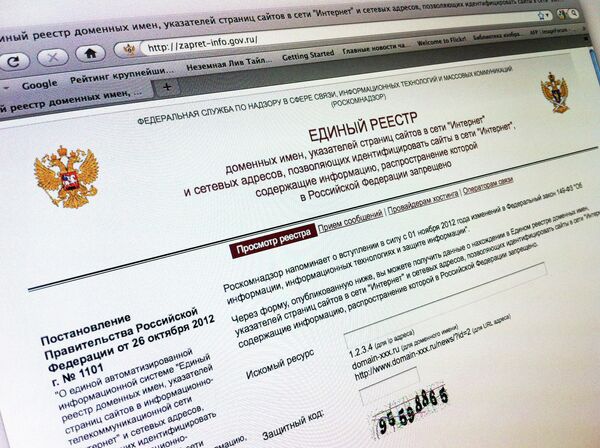MOSCOW, December 10 (RIA Novosti) - Russia's effort to blacklist harmful websites can only be effective if broad sections of civil society are involved in the process, Russian media and communications watchdog Roscomnadzor said on Monday.
According to a recent poll conducted by the Public Opinion Foundation, only 43 percent of web users, which translates into 23 percent of the country’s total population, are prepared to report unlawful activities.
This highlights the need to conduct “proactive information and awareness campaigns by advocacy groups and industry associations,” Roscomnadzor said in a comment on the poll.
Effective results in maintaining the register of banned websites can only be achieved as part of “a social contract” where the broadest possible sections of civil society are involved in the effort, the agency said.
Some 33 percent of respondents approved of Roscomnadzor’s activities.
In early November, Roscomnadzor blacklisted over 180 websites over offensive content.
A law creating a register of blacklisted websites, that aims to protect Russians from harmful content, was approved by the Russian parliament in July. Under this law, the authorities can now block access to sites containing child pornography, drug-related material and details about how to commit suicide without first having to obtain a court order or go to court.
Other sites containing offensive material can be shut down by court order.
The agency launched its register of blacklisted sites on November 1.
Its site reviews complaints lodged by members of the public, who can submit screenshots and URLs of offending sites. In the first 24 hours of its existence, zapret-info.gov.ru logged over 5,000 complaints of offensive content, 96 percent of which were rejected.
Rights groups condemned the move as an attempt to crack down on internet freedom.
In late November, the URL of YouTube, the video-sharing website owned by Google, was temporarily blacklisted due to “a technical problem,” Roscomnadzor said at the time.
YouTube was put on the blacklist and had three days to remove what Roscomnadzor said was “suicide promotion” content. Failure to do that would have caused YouTube to be blocked across Russia.




